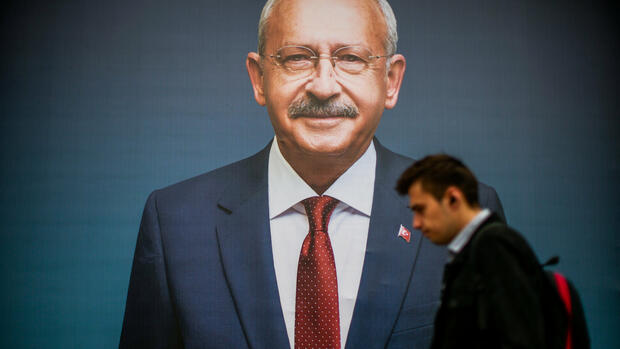The presidential candidate missed an absolute majority.
(Photo: AP)
Ankara Before the elections, his supporters called him the “Gandhi of Turkey”: opposition candidate Kemal Kilicdaroglu recorded his campaign videos in a middle-class kitchen typical of the country, with Turkish tea on the table and conciliatory words.
But after he and his CHP party did surprisingly poorly, the 74-year-old changes his tactics – and switches to a course that was otherwise known primarily from President Recep Tayyip Erdogan.
During the election campaign, Kilicdaroglu avoided nationalist symbols. In his most recent Twitter video, he is standing behind his desk with a large Turkish flag next to him. He’s gesturing wildly, his face expressing anger.
“I’m here and you’re here too!” he calls out straight into the camera. “I will fight to the end,” he adds, before banging the tabletop three times and shouting in time: “I – am – here!”
According to preliminary final results, Erdogan received the most votes in the presidential election on Sunday. However, he narrowly missed the required absolute majority of more than 50 percent with 49.51 percent. Kilicdaroglu received 44.8 percent of the vote. Both will compete against each other again in a runoff on May 28th.
The third-place winner can now decide which election recommendation he will give to his 2.8 million voters in the country.
(Photo: Reuters)
In the parliamentary elections taking place at the same time, Erdogan’s electoral alliance is expected to receive a comfortable majority. The opposition is thus missing its most important goal. She campaigned for a constitutional amendment to abolish Erdogan’s presidential system. She would have needed a three-fifths majority for that.
Bad mood after the elections in the CHP
After the elections, the disappointment in the opposition camp is great. “The mood is very depressed,” an official from Kilicdaroglu’s CHP party told the Handelsblatt. Kilicdaroglu doesn’t come off well in the opposition media either. “That probably means that the people are well fed!” was the headline in the newspaper “Sözcü”, alluding to the high number of votes for incumbent Erdogan, despite high inflation, especially for food.
Kilicdaroglu set out with five other parties to defeat Erdogan. Another party, the pro-Kurdish HDP, deliberately did not put forward its own presidential candidate and recommended that its voters vote for Kilicdaroglu. It was of little use.
The third presidential candidate, the nationalist Sinan Ogan, not only achieved a respectable result with five percent. He probably also got many votes from voters who did not like the cooperation between the opposition alliance and the HDP.
>> Read here: Sinan Ogan – the ultra-right kingmaker
It is doubtful whether that is the only reason for the poor performance. Shortly after the official election results were announced, the deputy head of the opposition candidate’s digital campaign, Onursal Adigüzel, handed in his resignation. Internally, it is said that he was pushed to do so because, for the second time after losing the 2018 election, he was unable to build up enough momentum on social media.
Within the party, the debate has long since begun as to whether Kilicdaroglu was the right man against Erdogan. The fact that Kilicdaroglu has insisted for a year now, among other things, on giving around a fifth of all CHP parliamentary seats to smaller parties for their support, without even consulting the party base, is now described as an “imposition” in his immediate environment.
Within the top leadership circle, the question is now openly discussed as to whether the good poll numbers shortly before the election were too trusting and resting on their laurels.
Polls had seen Kilicdaroglu before Erdogan
According to opinion polls by numerous companies, Kilicdaroglu was ahead of Erdogan for weeks. As of Sunday night, it’s clear that those polls have mostly been wrong.
>> Read here: The markets wanted the opposition – now Erdogan is leading
The opinion research institute MAK, for example, stated in a survey published on May 7 that Kilicdaroglu would achieve 50.9 percent in the presidential election, enough to secure a victory in the first ballot.
After the election, MAK chairman Mehmet Ali Kulat explained that the surveys had been made more difficult by the severe earthquakes in February and the Muslim month of fasting, Ramadan, between mid-March and mid-April.
There was about 20 days between the end of Ramadan and the elections, but polls are not allowed in the 10 days before an election, he said. At the same time, he admitted: “As a research company, we shouldn’t make any excuses.”
More: New government, new problems? What’s coming to the west
